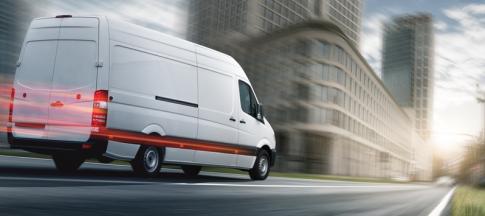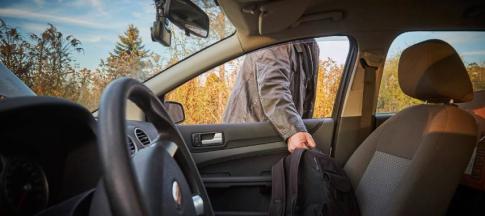
Vans are more often than not a workplace on wheels, so it pays to keep them secure.
Not only is there the cost of missing tools, but there could also be damage to your van, plus you might be out of work for a few days or even weeks while you try to get back on track.
That means tradespeople could be left thousands of pounds out of pocket.
Here are our top tips for stepping up your van security and keeping your contents safe.
How thieves break into vans
There are a few ways thieves break into vans.
They might:
- prise open the side panel or door (‘peel and steal’)
- break windows
- pick your locks
Relay theft
As van door lock security moves with the times, so do thieves.
Vans with electronic locks can also be targeted, using a relay box to effectively replicate the owner’s key fob. This is known as 'relay theft' or 'keyless theft'.
It's particularly dangerous as it leaves no trace, and it could even some time before the van owner realises they've been a victim of theft.
Read our in-depth guide on relay theft to find out more, including how to protect against it.
Choose your van door locks wisely
First of all, keep your van locked whenever it's unattended - even if you’re just paying for petrol or unloading at your place of work.
As well as your van’s factory-fitted security, there are some additional locks you can install:
Slamlocks
Slamlocks are a popular choice, which lock as soon as the door slides or slams closed.
These make sure the vehicle’s locked after you leave, meaning you can’t forget.
This comes with its own potential pitfalls though, such as increasing the chances of locking your keys in the van.
Deadlocks
If you’re considering upgrading your van security locks, getting van deadlocks fitted is a worthwhile option.
Deadlocks are much more difficult to pick than the spring mechanisms in standard slamlocks.
They will need to be professionally fitted though, and vary widely across makes and models.
Keeping your tools safe in the back
On top of keeping your van locked when you’re working and it’s unattended, another way to keep your stuff safe is to unload all the tools while not working.
But if it’s not practical or possible to unload fully at the end of every working day, it’s smart to take some extra steps to protect whatever you keep in the back:
- Keep equipment out of sight - if the back of the van has windows, consider getting them tinted, or getting a window blank or grille.
- Use a sticker to deter opportunistic thieves - often, tradespeople use stickers saying no tools are kept in the vehicle overnight.
- Use a tool store - these are steel storage boxes with an integrated lock, which you can fit inside the van.
- Install a bulkhead to separate the cab from the rear - plus, you can fit different locks in the cab and the back, so this will frustrate any attempts to steal equipment via smashing cab windows.
Park smart
Although some calculated thieves use hi-tech methods to break into vans, most thefts are opportunistic.
So parking your van safely is one of the most effective, and cheapest, security tips.
Ideally you should park:
- in a brightly lit area
- somewhere with CCTV
- with your sliding or rear doors tight to a wall to make it difficult for them to open or remove large equipment
Protect your catalytic converter
The catalytic converter is part of the exhaust system and turns combustion engine exhaust emissions into less harmful gases.
They contain precious metals, so when demand is high for these metals, catalytic converter thefts increase too.
And because the exhaust is relatively easy to get to with most vehicles – and especially those with high ground clearance – they’re often easy pickings for thieves.
Besides following the tips above to park safely, you should:
- avoid parking half on the kerb and half on the road, as this makes it easier to access the underneath of your van
- ask your local garage to weld the bolts to make your catalytic converter more difficult to remove if it’s bolted on
- consider a ‘cage clamp’ which locks around the converter
If you see someone acting suspiciously under a vehicle, report it to the police.
Other van security measures
- Buy a secure van: when looking for a van, make sure it has a Thatcham category 2-approved alarm and immobiliser.
- Lock down external tools: if you have ladders or tools that need to be fitted to the van’s exterior, be sure to secure them too with a lockable ladder clamp.
- Keep an inventory: make a thorough list of your equipment just in case things do go wrong. If you can, keep any receipts for equipment too. This will help if you need to make a van insurance claim, but also could be handy for your tax returns.
- Mark your property: marking your tools with a UV pen or stamp that’s specific to you may help you get them back if they’re recovered by police. Or if you chance upon them on Gumtree or in Cash Converters.
To be totally secure, get the right level of van insurance cover.
Consider insurance that covers goods in transit, your own goods and professional equipment, and Carriage of goods for hire and reward for transporting third-party goods.


